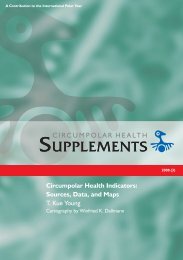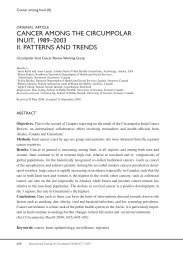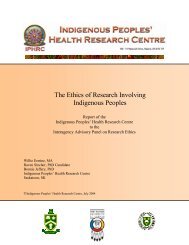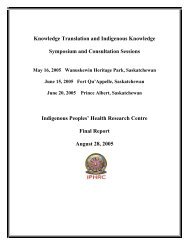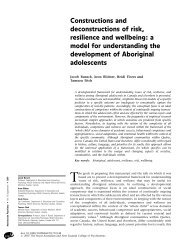EVALUATION OF THE ONTARIO COMMON ASSESSMENT ... - CCIM
EVALUATION OF THE ONTARIO COMMON ASSESSMENT ... - CCIM
EVALUATION OF THE ONTARIO COMMON ASSESSMENT ... - CCIM
Create successful ePaper yourself
Turn your PDF publications into a flip-book with our unique Google optimized e-Paper software.
OCAN Evaluation for Aboriginal Mental Health Programs<br />
In particular, programs endorse widening the use of OCAN within other Aboriginal mental health programs<br />
only if there is a commitment to resolve key cultural issues as well as cross jurisdictional impediments to health<br />
information sharing. Results of the survey (see Appendix E) illustrate the hesitation of participating program<br />
staff to recommend the adoption of the tool as it exists currently in other Aboriginal mental health programs.<br />
One participant has suggested the following:<br />
“standardized assessment is a useful aspiration for communication between mental health services<br />
providers but some items in this tool are not capturing helpful information. We need a long term<br />
research strategy to amend and validate an improved version of this tool that will tap into Aboriginal<br />
health needs”<br />
We expand on this assertion in the following Recommendations.<br />
2. Training<br />
RECOMMENDATION 2:<br />
Develop Aboriginal service specific training modules and support groups, including:<br />
► Aboriginal specific cases for training that reflect the Aboriginal service environment,<br />
client realities as well as culture and language and literacy issues.<br />
► Opportunities for Cree speaking programs and staff to enhance their OCAN lexicon<br />
and vocabulary and develop translation aids to better support effective interpretation<br />
at the community level.<br />
► Refresher training at more frequent intervals.<br />
► Ensure that the portal is user-friendly and accessible for providers with good<br />
instructions on how to access and navigate the portal.<br />
Rationale:<br />
Program staff described a number of training enhancements that could better support Aboriginal program<br />
participation in the implementation of OCAN. For example, workers found they were met with language and<br />
cultural challenges when they implemented OCAN, and they were not prepared for these challenges based<br />
on the case scenarios. Participants were clear they did not expect nor want OCAN to be translated into<br />
Aboriginal languages, however they felt they needed to brainstorm with other Aboriginal mental health<br />
services providers on how to best present, communicate, interpret and implement OCAN.<br />
As discussed, providers felt that many of their clients were not willing to use OCAN, and therefore they filled<br />
out few assessments in a particular time period. Refresher courses would help those staff members who are<br />
relatively inexperienced with OCAN due to their relatively infrequent use. Online tutorials for Aboriginal<br />
mental health service providers may be one way to address this issue.<br />
Sutherland & Maar - March 2010 Page 43



